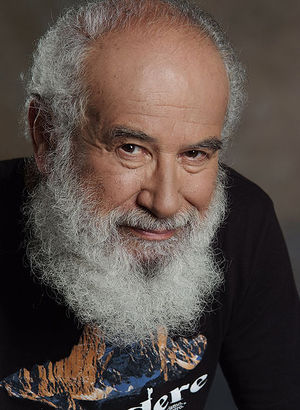Dov Frohman-Bentchkowsky: Difference between revisions
No edit summary |
No edit summary |
||
| (One intermediate revision by the same user not shown) | |||
| Line 1: | Line 1: | ||
== | == Biography == | ||
<p>[[Image:Bentchkowsky.jpg|thumb| | <p>[[Image:Bentchkowsky.jpg|thumb|right]] </p> | ||
<p>Dov Frohman-Bentchkowsky, developer of EPROM, has had a significant impact on the computer memory industry. EPROM became a key product for the [[Digital Signal Processing|digital processing]] and control engineering community. Using a simple poly silicon floating gate buried in pure silicon dioxide, EPROM became the first commercially successful non-volatile memory technology. Dr. Frohman-Bentchowsky’s work led to current generations of flash memory, which are found in devices ranging from mobile phones to media players to personal computers. </p> | <p>Dov Frohman-Bentchkowsky, developer of EPROM, has had a significant impact on the computer memory industry. EPROM became a key product for the [[Digital Signal Processing|digital processing]] and control engineering community. Using a simple poly silicon floating gate buried in pure silicon dioxide, EPROM became the first commercially successful non-volatile memory technology. Dr. Frohman-Bentchowsky’s work led to current generations of flash memory, which are found in devices ranging from mobile phones to media players to personal computers. </p> | ||
| Line 7: | Line 7: | ||
<p>A former vice president and general manager of Intel Israel until his retirement in 2001, Dr. Frohman-Bentchkowsky’s career began in 1965 as a member of the technical staff at Fairchild Semiconductor, where his work focused on Metal Oxide Semiconductors (MOS). Upon joining Intel in 1969, his concentration shifted from MOS to the fundamental research that led to EPROM, which overcame many of the limitations of other early non-volatile memory technologies including complex processing, exotic materials and poor charge retention. </p> | <p>A former vice president and general manager of Intel Israel until his retirement in 2001, Dr. Frohman-Bentchkowsky’s career began in 1965 as a member of the technical staff at Fairchild Semiconductor, where his work focused on Metal Oxide Semiconductors (MOS). Upon joining Intel in 1969, his concentration shifted from MOS to the fundamental research that led to EPROM, which overcame many of the limitations of other early non-volatile memory technologies including complex processing, exotic materials and poor charge retention. </p> | ||
<p>An [[IEEE Fellow Grade History|IEEE Fellow]], he holds six U.S. patents, has authored or co-authored more than 30 published works, including one of his most recent books, co-authored with Robert Howard, [http://www.leadershipthehardway.com Leadership The Hard Way]. He has previously received numerous awards, among them, the IEEE Jack Morton Award, the Israel Prize in Engineering and the [ | <p>An [[IEEE Fellow Grade History|IEEE Fellow]], he holds six U.S. patents, has authored or co-authored more than 30 published works, including one of his most recent books, co-authored with Robert Howard, [http://www.leadershipthehardway.com Leadership The Hard Way]. He has previously received numerous awards, among them, the IEEE Jack Morton Award, the Israel Prize in Engineering and the [[IEEE Edison Medal]] in 2008 “For pioneering the development of the MOS Erasable, Programmable Read Only Memory (EPROM), a key enabler of the information age revolution.”</p> | ||
<p>Dr. Frohman-Bentchowsky holds a bachelor’s degree in electrical engineering from the Israel Institute of Technology, Haifa, and a masters and doctorate in electrical engineering and computer science from the University of California, Berkeley. He also holds an honorary doctorate from Technion, Israel Institute of Technology, Haifa. </p> | <p>Dr. Frohman-Bentchowsky holds a bachelor’s degree in electrical engineering from the Israel Institute of Technology, Haifa, and a masters and doctorate in electrical engineering and computer science from the University of California, Berkeley. He also holds an honorary doctorate from Technion, Israel Institute of Technology, Haifa. </p> | ||
[[Category:Signals|Frohman-Bentchowsky]] [[Category:Signal processing|Frohman-Bentchowsky]] [[Category:Digital signal processing|Frohman-Bentchowsky]] [[Category:Components, circuits, devices & systems|Frohman-Bentchowsky]] [[Category:Solid state circuits|Frohman-Bentchowsky]] [[Category:Transistors|Frohman-Bentchowsky]] | |||
Revision as of 19:56, 11 January 2012
Biography
Dov Frohman-Bentchkowsky, developer of EPROM, has had a significant impact on the computer memory industry. EPROM became a key product for the digital processing and control engineering community. Using a simple poly silicon floating gate buried in pure silicon dioxide, EPROM became the first commercially successful non-volatile memory technology. Dr. Frohman-Bentchowsky’s work led to current generations of flash memory, which are found in devices ranging from mobile phones to media players to personal computers.
A former vice president and general manager of Intel Israel until his retirement in 2001, Dr. Frohman-Bentchkowsky’s career began in 1965 as a member of the technical staff at Fairchild Semiconductor, where his work focused on Metal Oxide Semiconductors (MOS). Upon joining Intel in 1969, his concentration shifted from MOS to the fundamental research that led to EPROM, which overcame many of the limitations of other early non-volatile memory technologies including complex processing, exotic materials and poor charge retention.
An IEEE Fellow, he holds six U.S. patents, has authored or co-authored more than 30 published works, including one of his most recent books, co-authored with Robert Howard, Leadership The Hard Way. He has previously received numerous awards, among them, the IEEE Jack Morton Award, the Israel Prize in Engineering and the IEEE Edison Medal in 2008 “For pioneering the development of the MOS Erasable, Programmable Read Only Memory (EPROM), a key enabler of the information age revolution.”
Dr. Frohman-Bentchowsky holds a bachelor’s degree in electrical engineering from the Israel Institute of Technology, Haifa, and a masters and doctorate in electrical engineering and computer science from the University of California, Berkeley. He also holds an honorary doctorate from Technion, Israel Institute of Technology, Haifa.
